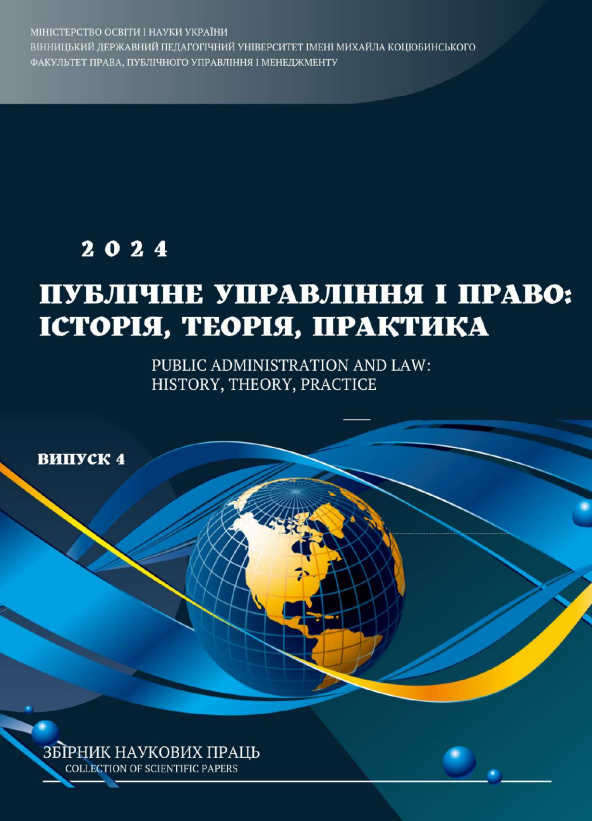Articles
FEATURES OF APPLICATION OF PEDAGOGICAL TECHNOLOGIES OF LAW STUDY IN HIGHER SCHOOL
https://doi.org/10.31652/2786-6068-2024-4-6-14Published 2024-09-18
Keywords
- modular training,
- block-tutor technology,
- case analysis method,
- legal clinic,
- street law
- artificial intelligence in education ...More
How to Cite
FEATURES OF APPLICATION OF PEDAGOGICAL TECHNOLOGIES OF LAW STUDY IN HIGHER SCHOOL. (2024). Public Management and Law History Theory Practice, 4, 8-16. https://doi.org/10.31652/2786-6068-2024-4-6-14
Abstract
The article examines the peculiarities of the use of pedagogical technologies in teaching law in higher education, since pedagogical technology functions both as a science that investigates the most rational ways of learning and as a system of methods, principles and regulations used in education, and as a real learning process. The demands of modernity leave before the legal higher task to form not only highly educated, but also capable of independent, creative thinking, adapting to the conditions of personality creation. This requires changes in the activity of the teacher of legal disciplines and, first, requires interaction with students and the processes of their self-development and self-organization. New and existing learning technologies are being developed and are adapted to the specific conditions and specifics of educational institutions. In this regard, various technologies for the analysis of pedagogical activity are being developed, which stimulate the strengthening of student independence, provide for the development of self-regulation processes of the joint activity of the teacher and students, and contribute to the improvement of the quality of the educational process as a whole. Based on the fact that the Institute of Pedagogical Technologies is the subject of wide scientific discussions both in Ukraine and abroad, the authors researched the stages of introducing the concept of pedagogical technologies into scientific circulation and its connection with the method of teaching law. Turning to the conceptual evolution of the theoretical origins of pedagogical technologies made it possible to analyze their essence and content, to investigate the structural-functional and subject-technological characteristics of the most popular pedagogical technologies, which the authors successfully implement in their teaching practice. Special attention is paid to the analysis of the current state of pedagogical technologies and problems arising in the process of studying law, it is concluded that the effectiveness of the educational process depends on many factors. But it is undeniable that success in the implementation of even the most advanced pedagogical systems and tasks depends on the personality of the teacher, his skill and moral qualities. Since the purpose of the article is to evaluate the effectiveness of the potential of the features of the application of pedagogical technologies in general, as well as the use of the most modern of them in the process of training legal specialists, the authors came to a conclusion about the importance of an integrative understanding of pedagogical technologies, noted their inherent universality, which is based on a combination of variability and alternative with personally oriented approach. The article emphasizes that it is worth distinguishing pedagogical technology from teaching methods. The difference is that pedagogical technologies can be reproduced and replicated and, at the same time, guarantee the high quality of the educational process. Based on the research objectives, special attention is paid to the evaluation of the effectiveness of such pedagogical technologies as modular learning, block-tutor technology, the method of case analysis, legal clinic activities, street law, e-learning and the use of artificial intelligence. A conclusion is made regarding the need to master special methods, techniques and technologies in the field of modern education, which, in turn, provides a real opportunity to effectively perform tasks in the conditions of modern global challenges, which the world as a whole and Ukraine in particular are facing.Downloads
Download data is not yet available.
References
- Abrahams, Ian & Reiss, Michael J. (2012). Practical work: Its effectiveness in primary and secondary schools in England, Journal of Research in Science Teaching. 49. Issue 8. 1035-1055. Retrieved from: https://doi.org/10.1002/tea.21036 DOI: https://doi.org/10.1002/tea.21036
- Kamp, A. R. Jurisprudence: A Beginner’s Simple and Practical Guide to Advanced and Complex Legal Theory (2009). The Crit: Critical Stud. J. 62. Retrieved from: http://repository.jmls.edu/facpubs/60 DOI: https://doi.org/10.2139/ssrn.1328386
- Elektronizace výuky práva (2020). CVRČEK, František a kol. Elektronizace výuky práva. 1. vyd. Plzeň: Západočeská univerzita v Plzni. S. 120. Retrieved from: https://doi.org/10.24132/ZCU.2020.09976 DOI: https://doi.org/10.24132/ZCU.2020.09976
- Navolokova, N.P. (2019). Entsyklopediia pedahohichnykh tekhnolohii ta innovatsii [Encyclopedia of pedagogical technologies and innovations]. Kharkiv: Vyd. hrupa «Osnova». S. 176. [in Ukrainian].
- Materialy Hakatonu z Praktychnoho prava (Street Law) «Zabezpechennia pravovykh potreb liudei v umovakh viiny» [Gakaton Materials on Practical Law (Street Law) «Ensuring the legal needs of people in conditions of war»]. Retrieved from: https://legalclinics.in.ua/materialy-gakatonu-street-law-zabezpechennya-pravovyh-potreb-lyudej-v-umovah-vijny/ [in Ukrainian].
- Holovko, N.I. (2017). Metodyka vykladannia pravoznavstva: navch. posib. [Methodology of teaching jurisprudence: education. manual]. Vydavnychyi dim «Personal». S. 202. [in Ukrainian].
- Pro skhvalennia Kontseptsii Derzhavnoi tsilovoi naukovo-tekhnichnoi prohramy z vykorystannia tekhnolohii shtuchnoho intelektu v priorytetnykh haluziakh ekonomiky na period do 2026 roku [On the approval of the Concept of the State targeted scientific and technical program for the use of artificial intelligence technologies in priority sectors of the economy for the period until 2026] : Rozporiadzhennia Kabinetu Ministriv Ukrayiny vid 2 hrudnya 2020 r. № 1556-р. Retrieved from: https://zakon.rada.gov.ua/laws/show/1556-2020-%D1%80#Text [in Ukrainian].
- Romaniv, Kh.B. (2020). Informatsiino-komunikatsiini tekhnolohii yak zasib pidvyshchennia profesiinoi maisternosti studentiv-pravnykiv [Information and communication technologies as a means of improving the professional skills of law students]. Pravo ta innovatsii. 4 (32). 55-61. [in Ukrainian]. DOI: https://doi.org/10.37772/2518-1718-2020-4(32)-8
- Fedorchuk, O. (2023) Osoblyvosti zastosuvannia informatsiino-komunikatsiinykh tekhnolohii u vyshchii yurydychnii osviti [Peculiarities of the use of information and communication technologies in higher legal education]. Suchasni informatsiini tekhnolohii ta innovatsiini metodyky navchannia v pidhotovtsi fakhivtsiv: metodolohiia, teoriia, dosvid, problemy. 70, 222-230. Retrieved from: https://doi.org/10.31652/2412-1142-2023-70-221-230 [in Ukrainian]. DOI: https://doi.org/10.31652/2412-1142-2023-70-221-230
